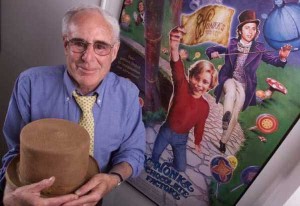
If not for Mel Stuart’s daughter’s appreciation of 1960s literature, we might never have gotten the director’s masterwork, Willy Wonka and the Chocolate Factory. The young girl literally handed her father the sardonic 1964 Roald Dahl book “Charlie and the Chocolate Factory” and told him to film it. It was the late 1960s, and the long-time documentary filmmaker Stuart had worked in David L. Wolper’s organization making intriguing works such as 1960’s The Making of the President, an insightful television piece about John F. Kennedy.
Thus, with only one narrative feature under his belt, the underrated If It’s Tuesday, It Must Be Belgium in 1969, Stuart, working for Wolper, endeavored to make Wonka in 1970. Of his longtime association with Wolper, Stuart recently confessed, “I didn’t make the money I wanted to, but I got to make the movies I wanted to make.” Wolper used to sell his numerous TV documentaries to sponsors and he did so with Wonka, purchasing the book rights and getting sponsorship for the film from Quaker Oats, who liked the food tie-in. And thus, the team embarked on the Wonka journey, with Stuart insisting that the production cast the film largely in the United States but continue casting additional parts and engage in principal photography in Europe.
“I didn’t want you to be able to recognize anything in the movie,” Stuart said about his choice to film in Germany, giving the film a non-specific setting, with a mixture of American and European actors in key roles. Of course, Gene Wilder went on to create one of the classic screen performances as the title character, with many of the supporting parts also appropriately cast – both children and adults alike.
Though Dahl had written a script, Stuart enlisted writer David Seltzer to punch up the film’s terse sarcasm which has made it such an enduringly great film, pertinent to any era. Dahl posited children of the ‘60s as the spoiled brat offspring of the oblivious previous generation, a sentiment seconded by Stuart and communicated by Seltzer. Special sections that Seltzer and others added included the fate of the Wonka bars themselves during the search for the golden tickets.
Inside Bavaria Studios in a suburb of Munich, Stuart enlisted production designer Harper Goff to create the chocolate fantasy land of Wonka’s factory. Exteriors were filmed in an around Munich and neighboring towns. Oompa Loompas were Stuart’s idea, particularly the green hair and orange faces, as the black pygmies described in the book were too controversial to portray on film. Many of the little people cast throughout Europe spoke little or no English and vaguely lip-synched their recurring song in the film. David Saxon was on hand in Germany to edit the footage which he finished in Los Angeles where pickup shots were executed.
Oddly, this beloved family film was not successful upon its initial release and only became popular later on television and home video when Warner Bros. held the rights. Stuart went on to a rich career making films and documentaries both with Wolper and on his own later. One of his other early 1970s high points was with the musical film Wattstax (1973), described as a Woodstock for the African-American community. Stuart was active until 2011, constantly on the phone doing deals, often spotted at Canter’s on Fairfax dining with writers. He only later learned of Wonka’s status as a classic and wrote a book about making the film.
When he viewed it at a Pomona Fox Theater screening in 2010, he confided about the timelessness of the images he produced, “I’m glad I made the picture then; I don’t know if I could do that now.”





